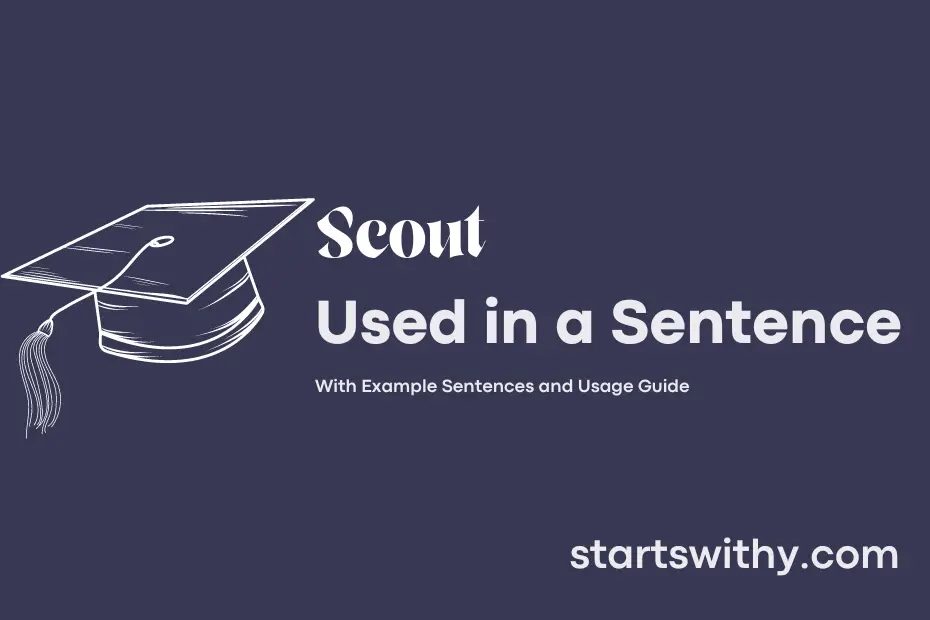Have you ever wondered what it means to “scout” for something? Scouting involves searching for, discovering, and observing something with a specific purpose in mind.
In everyday life, you may scout for the best deals at a store, scout out potential locations for a picnic, or scout a location for a photoshoot. By actively seeking and evaluating options, scouting helps individuals make informed decisions and choose the best course of action.
7 Examples Of Scout Used In a Sentence For Kids
- Scout helps us learn about nature.
- We can scout for different insects in the garden.
- Let’s scout for colorful flowers in the park.
- The scout always knows the right path to take.
- We can scout for birds in the sky.
- Scout teaches us how to be brave and helpful.
- Let’s scout for different shapes in the clouds.
14 Sentences with Scout Examples
- Scout the best places to eat near campus for affordable and tasty meals.
- Make sure to scout for good study spots in the library before exam season gets too crowded.
- Don’t forget to scout out potential internships and job opportunities at the upcoming career fair.
- It’s a good idea to scout out the cheapest photocopying services for course materials.
- Take some time to scout out the best deals and discounts on textbooks before the new semester starts.
- Scout for reliable group study partners to ace those tough assignments and projects.
- Make sure to scout different routes to campus to avoid traffic and reach on time.
- Scout for affordable and safe accommodation options near campus for the upcoming academic year.
- Scout for clubs and organizations that interest you to get involved and make new friends.
- It’s important to scout out mentors in your field of study for guidance and advice on career choices.
- Take the time to scout out scholarship opportunities to help with tuition fees and expenses.
- Scout for local volunteer opportunities to give back to the community and gain valuable experience.
- Don’t forget to scout out the best places to buy stationery and supplies for your academic needs.
- Make sure to scout for potential study abroad programs to enhance your college experience.
How To Use Scout in Sentences?
Scout can be used as both a noun and a verb in a sentence. As a noun, it refers to a person or group of people sent out to gather information or keep watch. For example, “The scout found the best location for the campsite.” When used as a verb, it means to observe or search for information about something. For instance, “We need to scout the area before starting the project.”
To use Scout in a sentence, begin by identifying whether you want to use it as a noun or a verb. Then, place the word appropriately within the context of your sentence. Remember to capitalize the word when using it as a noun (e.g., “We sent out a Scout to explore the terrain.”).
When using Scout as a verb, make sure to pair it with a subject and an object to complete the sentence. For example, “The team will scout the competition before the tournament.” In this sentence, “team” is the subject performing the action of scouting, and “competition” is the object of the scouting activity.
Practice incorporating Scout in various sentences to become familiar with its usage as both a noun and a verb.
Conclusion
In conclusion, from the sentences provided, it is evident that a scout plays a crucial role in gathering information, navigating challenging terrain, and keeping a lookout for potential danger. Their keen observation skills and ability to communicate effectively are essential for the success of a mission or expedition. Whether in the military, scouting organizations, or other fields, the role of a scout is to gather intelligence and provide necessary information for informed decision-making.
Scouts are trained individuals who serve as eyes and ears for a team or organization, often venturing ahead to assess a situation before others proceed. Their contributions are valuable in assessing risks, identifying opportunities, and ensuring overall safety. The examples of sentences with the keyword “scout” demonstrate the importance of this role in various contexts where reconnaissance, surveillance, and information gathering are vital components of success.



